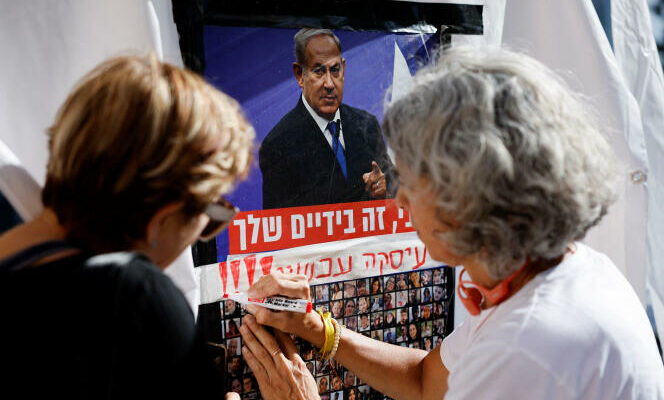Everyone has their own images. Those of Israeli hostages held by Hamas appear everywhere, from the halls of Tel Aviv airport to major road intersections, on television banners and on the front pages of newspapers and Internet sites. In a more confidential setting, the office of Yehuda Fuchs, commander of the Israeli army for “central region” – the West Bank occupied by Israel since 1967 – houses photos of Hamas executives: Yahya Sinouar, the political leader of the movement, Mohammed Deif, head of the armed wing, and others less known – between fifty and a hundred people , according to the Israeli daily Yedioth Aharonoth. Major General Fuchs knows these faces: from 2016 to 2019, he was commander of the Gaza division, responsible for monitoring the enclave.
All of Israel is suspended between these two demands. Bring the hostages back alive, while promising to shoot their captors. According to a poll commissioned by the Israel Democratic Institute, more than 90% of respondents want both the release of those kidnapped, the destruction of Hamas and the restoration of deterrence. But, for the most right-wing population of the country, the first of these objectives is considered contradictory with the other two. And Benjamin Netanyahu himself cannot escape this tension between two poles.
The Israeli leader wants to keep control of the Israeli right. But he faces competition from Yoav Gallant, minister of defense on the offensive, and his most radical allies in the coalition, notably Itamar Ben Gvir, minister of national security. The latter declared on Channel 14, the mouthpiece of the radical right, that the exchange agreement was a “disaster” – and voted against it, as did the deputies of his party. “Hamas wanted this truce above all else”, he added, recalling that, during the release of the Franco-Israeli hostage Gilad Shalit, in 2011, more than a thousand Palestinian prisoners had been released, including Yahya Sinouar – an agreement wanted at the time by Benjamin Netanyahu. The Minister of Defense continues to repeat that the harshness of the Israeli offensive, which caused the death of nearly fifteen thousand Palestinians, according to Hamas, made it possible to negotiate the current liberation from a position of strength.
” Win time “
For the moment, Itamar Ben Gvir’s maximalist positions are serving him: in the polls, his party, Otzma Yehudit (“Jewish power”), is holding its own, while the Religious Zionist Party, led by Bezalel Smotrich, the other supremacist representative of the coalition, who voted for the agreement with Hamas, falls for the first time below the threshold of representation in the Knesset. As for Likud, Mr. Netanyahu’s party, it is no longer Israel’s leading party, coming in second behind the National Unity Party, an opposition coalition led by Benny Gantz and Gideon Saar.
You have 50% of this article left to read. The rest is reserved for subscribers.
